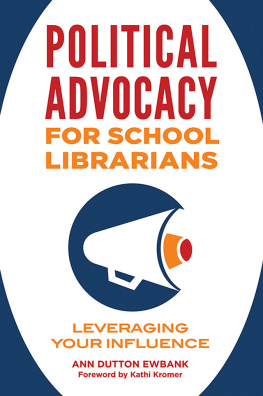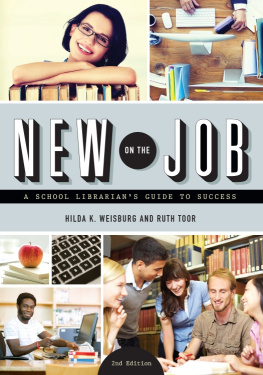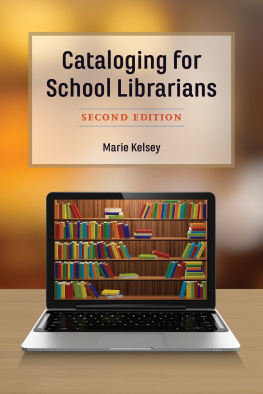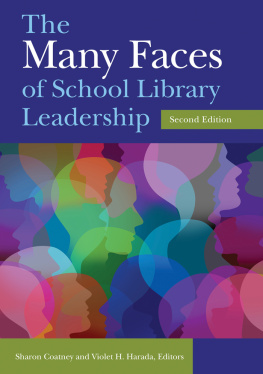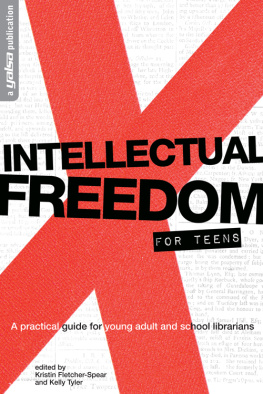INTELLECTUAL FREEDOM ISSUES IN SCHOOL LIBRARIES
April M. Dawkins, Editor

Copyright 2021 by ABC-CLIO, LLC
All rights reserved. No part of this publication may be reproduced, stored in a retrieval system, or transmitted, in any form or by any means, electronic, mechanical, photocopying, recording, or otherwise, except for the inclusion of brief quotations in a review, without prior permission in writing from the publisher.
Library of Congress Cataloging-in-Publication Data
Names: Dawkins, April M., editor.
Title: Intellectual freedom issues in school libraries / April M. Dawkins, editor.
Description: Santa Barbara, California : Libraries Unlimited, 2021. | Includes bibliographical references and index.
Identifiers: LCCN 2020014984 (print) | LCCN 2020014985 (ebook) | ISBN 9781440872365 (paperback) | ISBN 9781440872372 (ebook)
Subjects: LCSH: School librariesCensorshipUnited States. | School librariesUnited StatesAdministration. | Intellectual freedomUnited States. | Freedom of informationUnited States.
Classification: LCC Z675.S3 I447 2020 (print) | LCC Z675.S3 (ebook) | DDC 025.1/9780973dc23
LC record available at https://lccn.loc.gov/2020014984
LC ebook record available at https://lccn.loc.gov/2020014985
ISBN: 978-1-4408-7236-5 (paperback)
978-1-4408-7237-2 (ebook)
25 24 23 22 211 2 3 4 5
This book is also available as an eBook.
Libraries Unlimited
An Imprint of ABC-CLIO, LLC
ABC-CLIO, LLC
147 Castilian Drive
Santa Barbara, California 93117
www.abc-clio.com
This book is printed on acid-free paper 
Manufactured in the United States of America
The information provided in this book does not, and is not intended to, constitute legal advice; instead, all information, content, and materials are for general informational purposes only. Readers of this book should contact their attorney to obtain advice with respect to any particular legal matter. Only your individual attorney can provide assurances that the information contained hereinand your interpretation of itis applicable or appropriate to your particular situation.
Contents
Helen R. Adams
Helen R. Adams
Christine Eldred
Helen R. Adams
Helen R. Adams
Helen R. Adams
Elizabeth Burns
Helen R. Adams
Chad Heck
Helen R. Adams
Maria Cahill
Helen R. Adams
Helen R. Adams
Sara E. Wolf
Helen R. Adams
April M. Dawkins
April M. Dawkins
Kristin Zeluff
Helen R. Adams
Kathryn K. Brown
Judi Moreillon
Judi Moreillon
Judi Moreillon
Dee Ann Venuto
Rebecca Hill
April M. Dawkins
Sabrina Carnesi
Gail K. Dickinson
Gail K. Dickinson
Helen R. Adams
Judi Moreillon
Helen R. Adams
Patricia Franklin and Claire Gatrell Stephens
Helen R. Adams
Monica Cabarcas
Helen R. Adams
Helen R. Adams
Helen R. Adams
Helen R. Adams
Helen R. Adams
Helen R. Adams
Helen R. Adams
Chad Heck
Annalisa Keuler
Ernie Cox
Stephanie Kurtts, Nicole Dobbins, and Natsuko Takemae
Heather Moorefield-Lang
Heather Moorefield-Lang
Kimberly Gangwish
Helen R. Adams
Lucy Santos Green and Michelle Maniaci Folk
Mary Frances Zilonis and Chris Swerling
Mary Frances Zilonis and Chris Swerling
Mary Frances Zilonis and Chris Swerling
Jamie Campbell Naidoo
April M. Dawkins
Judi Moreillon
Introduction
Intellectual freedom is a basic tenet of the library profession. However, as school librarians, we are often challenged to defend the rights of our students, sometimes even defending those rights with other adults in our own school buildings. My first true experience with censorship actually occurred early in my career as a high school librarian. I had just completed a display of new arrivals in the library when a member of the faculty wandered in during his planning period. I excitedly encouraged him to explore all of the new books that had just been added to the collection. After several minutes of perusing the new books, he brought one of them to me with the question, Why on earth would you include this book in the library? I was taken aback. I was totally unprepared for the question. The book was Boy Meets Boy by David Levithan. Luckily, I recovered quickly and was able to have a conversation with this teacher about why teenagers should have access to books that might not reflect his own personal beliefs. While he did not leave that day in agreement with me, I believe that our conversation was a pivotal moment in my own belief in the importance of protecting the rights of students to read.
When hearing the phrase intellectual freedom, many often equate the phrase only with censorship and the banning of books. However, intellectual freedom has a much broader application in the school library world. The rights associated with intellectual freedom include not only the right to read, but also the right to free and equitable access to technology, the right to privacy in intellectual and personal pursuits, the right to access diverse content that reflects not just our own identities but provides insights into those different from ourselves. As school librarians, we are called upon to remove as many barriers to access to information as we possibly can.
As the editor of this book, I have selected articles from School Library Connection , and its predecessors, School Library Monthly and Library Media Connection , which highlight intellectual freedom issues that are faced by school librarians as they seek to protect the rights of students and guarantee them equal and free access to information. Each of the seven parts of this book addresses a different aspect of the intellectual freedom issues that arise in school libraries. While the book can be read from beginning to end, I hope that you will be able to pull information from the book as you find it useful in defending the intellectual freedom rights of your students. Each chapter has been reviewed, edited, and updated with the most recent information available.
of this book sets the stage for the remainder of the volume.
, Intellectual Freedom Advocacy and the Right to Read, examines the many ways school librarians can advocate for student access to the library and their right to read. Several articles in this section explore leadership and advocacy. Particularly helpful are articles about how to advocate with specific stakeholder groups including teachers, principals, and parents. Additionally, this section provides an introduction to Banned Books Week and a terrific section on advocating for intellectual freedom throughout the school year. Several articles also examine barriers to the right to read including labeling books with reading levels and the use of computerized reading programs such as Accelerated Reader.
School librarians can use , Policies and Procedures, to develop or revise their selection and reconsideration policies as well as explore how other circulation policies may restrict access to information. The articles in this section provide practical tips on developing selection policies as well as acceptable use policies for computer and Internet usage. Additionally, articles explore relevant laws that impact the access of students such as the Childrens Internet Protection Act (CIPA). Two of my own articles appear in this section providing tips for developing selection policies and reconsideration policies. Articles on circulation policies, overdues and fines, and providing access in juvenile detention centers provide information on current issues and trends in intellectual freedom news.
Next page

